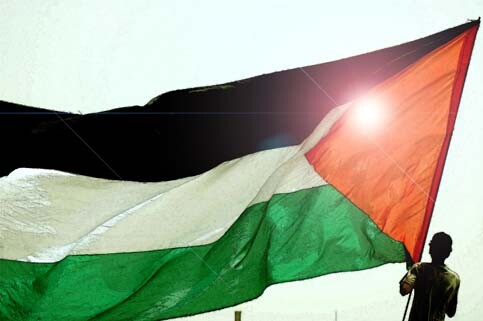Al-Haq 5 June 2006

A youth holds-up a big Palestinian flag during a protest against the controversial separation wall in the West Bank village of Bilin west of Ramallah June 2, 2006. (MaanImages/Fadi Arouri)
5 June 2006 marks the 39th anniversary of the Israeli occupation of the West Bank, including East Jerusalem, and the Gaza Strip. It ends another year of suffering, human rights violations, and the denial of self-determination to the Palestinian people. Israel’s occupation has continued to create “facts on the ground” through settlement expansion, the construction of the Annexation Wall, and increasingly severe movement restrictions. Combined with the refusal by Israel to transfer Palestinian revenues, and the withdrawal of support by major international donors, these measures have crippled the Palestinian economy. Incessant Israeli military incursions, arrest raids, targeted assassinations, and in Gaza, shelling, have maintained violence as a consistent backdrop to every day life in the Occupied Palestinian Territories (OPT).
Israel’s 2005 unilateral withdrawal from Gaza and parts of the West Bank diffused criticism and pressure from the international community, allowing Israel’s occupation of the OPT, and associated violations of international law, to continue unchallenged. The withdrawal did not end the occupation of Gaza. Israel still controls Gaza’s land borders, sea access, and air space, and has repeatedly launched military attacks in the region by air and land. Basic infrastructure in Gaza, such as electricity and water supply, is still controlled by Israel, as is the population registry.
Israeli Prime Minister Olmert’s unilateral plans for the West Bank promise even less than the Gaza withdrawal. Under the current framework, as few as 20-30 settlements, out of over 150, would be dismantled. Settlers would simply be relocated to other settlements in the West Bank, including in East Jerusalem, which Israel has announced it will incorporate. It would also retain control of the Jordan Valley, one of the most important agricultural areas of the West Bank. Unlike Gaza, there would be no military withdrawal but rather a redeployment of Israeli forces inside the West Bank.
More than half of the Wall has been completed, and the remaining construction has been accelerated, in disregard of the International Court of Justice’s 2004 determination that the construction of the Wall in OPT violates international law. East Jerusalem has been increasingly isolated from other areas of the West Bank, severely reducing access to employment, education, and medical treatment. Restrictions on movement have intensified between the northern, central, and southern areas of the West Bank, and have been particularly acute in the Jordan Valley and in the areas located between the Green Line and the Wall.
Israel also continues to use excessive, and often lethal, force. Gaza is under intensive aerial bombardment. In the West Bank, arrest raids and incursions continue to result in unnecessary civilian injuries and deaths, while targeted assassinations in both the West Bank and Gaza still injure and kill innocent bystanders, including women and children. Since 31 May 2005, Al-Haq has documented a total of 131 Palestinians killed, whereof 31 children and 23 as a result of Israeli targeted assassinations.
In parallel, the ability of the Palestinian National Authority to uphold the rule of law has been constantly eroded. This has resulted in increased internal instability, causing further harm to the Palestinian civilian population. The recent withdrawal of support by major international donors, coupled with Israels refusal to transfer Palestinian revenue, has denied over 150.000 Palestinian civil servants their source of income, upon which some 25 percent of the population depend. Al-Haq is concerned that the OPT is on the brink of descending into civil war.
Since it was founded in 1979, Al-Haq has observed a continuous deterioration in the human rights situation. Israel’s occupation of the OPT perpetuates the suffering of the Palestinian people, exacerbates tensions, escalates the conflict and destabilises the region. Thirty-nine years ago, the UN Security Council called for an end to the occupation, yet 5 June 2006 will mark the beginning of the 40th year of the occupation. At a time when the international community must play a decisive role in achieving a solution based on the respect for international law, much had been said but little has been done. It is imperative that the international community finally find the lacking political will to oppose Israel’s unilateral measures and establish respect for international law as the only basis for a just and durable solution to the conflict and the end of the occupation.
Al-Haq was established in 1979 by a group of Palestinian lawyers following extended debate over how best to address the lack of human rights protection mechanisms in the Occupied Palestinian Territories (OPT). Founded as Law in the Service of Man, Al-Haq was one of the first human rights organisations established in the Arab world.
Related Links